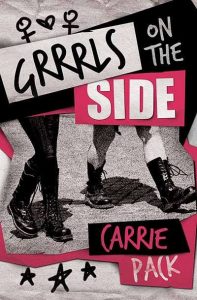Tabitha doesn’t feel like she belongs anywhere. Her ex-best friend is now her number one bully, and the only friend she has is only her friend because they smoke together and enjoy the same type of music. One night, her friend, Mike, invites her to a concert, where Tabitha is introduced to the Riot Grrrls. Soon, she finds herself with a new group of friends, an increased desire to smash the patriarchy, and some interesting new feelings for a fellow Riot Grrrl.
Before I jump into my (potentially muddled) thoughts about this book, I need to start with some Trigger Warnings for this book, because they are extensive: This book contains racism, homophobia, biphobia, fatphobia, and sexual assault. Another warning I feel is important to add is that these issues are not always dealt with in the best of ways.
Now that that is out of the way, let me start trying to unravel the range of emotions I felt while reading Grrrls on the Side.
As you can probably tell from the trigger warnings, this book deals with some heavy content. The problem is that it doesn’t often deal with it in an appropriate manner. Often, conflicts are resolved within a page or two, and the resolutions feel half-assed. Most of the time the conversations about issues like racism, homophobia, biphobia, fatphobia, and sexual assault, read more like after-school PSA specials than actual real-life conversations. It’s frustrating, because I feel like this book scratches the surface of something that could have been wonderful, but never allows its characters to go deep enough to truly get to that wonderful place.
I had a hard time being invested in the main relationship, as well. Here we have an unaware racist bisexual white girl, dating a biphobic black lesbian. Any time Jackie, Tabitha’s girlfriend, brings up issues she has with the Riot Grrrls regarding race, or issues she has with things Tabitha says that are racist, Tabitha either doesn’t accept her explanations, or tells her that she gets it while it’s obvious that she really doesn’t. [major spoiler] Tabitha only seems to fully understand the issues Jackie deals with due to the intersection of being a black lesbian after she has a conversation with a white woman, which is pretty problematic considering her girlfriend has been telling her the exact same things the entire book [end spoiler]. On the other hand, after a bout of irrational jealousy, Jackie blurts out some majorly biphobic sentiments. She immediately tries to retract them, and the issue is seemingly resolved, but it left an awful taste in my mouth. Things like that don’t just come out of your mouth when you’re angry unless you genuinely believe them. I had a really hard time rooting for these two, and in fact often wondered what they even see in each other that would make them stick through this clear lack of acceptance of integral parts of each other.
Something I feel very conflicted about is the way that the Riot Grrrls interactions are portrayed. Almost every single scene that involves more than two Riot Grrrls ends in a fight breaking out. One character, Marty, is unapologetically racist, and although she is called out on it, it’s always quickly swept under the rug. The fact that Venus, who is the usual subject of Marty’s racism, continues to stick around the Riot Grrrls despite this is pretty implausible. Racism aside, though, there is a strong amount of internalized misogyny in these patriarchy smashers. We have two instances of female relationships breaking apart because of a man (one of which I will discuss more in a moment), and I can only think of one scene in which two or more Riot Grrrls being together doesn’t end in a massive fight. These girls are meant to be friends, but that doesn’t come across through the text. In fact, more than once I found myself scratching my head and wondering why any of them even bother hanging out with each other, since they obviously dislike each other so much. I don’t know much about the original Riot Grrrls movement, but from my limited understanding, the point was to form a sisterhood. To join together against the patriarchy. I can’t even tell you a single thing that any of these girls have in common with each other. They are simply thrown together and fight.
That all being said, a part of me actually appreciated this. There seems to be a misunderstanding that being a feminist automatically assumes that you will put women’s desires first, or that your ideals will always match with your actions. The truth is that a lot feminists, even intersectional feminists, can be racist, misogynistic, homophobic, etc. Hypocrisy can run wild, and that is brought out in this book. My only issue with this is that there is no contrasting portrayal of genuine female connection. I know that Jackie and Tabitha are supposed to exemplify this, but their obvious difference in world views (see above) kind of cancels out any healthy relationship they may have. The only character who seems to be kind and open with everybody is Cherie, the sole non-white and non-black character in the novel, but she is relegated to the role of sidekick and given, at most, one important scene in the book.
The way that sexual assault was handled here was, at best, sloppy. A sexual abuse survivor sits in a room, sobbing, while two other girls debate whether the word “rape” should be used for anything other than… well, rape. Later, Tabitha is groped and forcefully kissed by a man, touting lesbophobic sentiments, and when she confronts her then-girlfriend Kate, she is rebuffed. Kate, who earlier was so concerned with how using the word “rape” for any type of unwanted attention devalues it for rape survivors, nonchalantly tells Tabitha that the man is “harmless” and that he only did it to “get back at her” (he’s an ex-boyfriend). They break up, and the issue is dropped (with a brief mention that the school has transferred the boy out of Tabitha’s classes). Kate eventually apologizes in a supremely mediocre way, and Tabitha accepts, even though this makes no sense. Then, we are informed that Tabitha’s mean ex-best friend is dating her assailant. She is rude to Tabitha when she tells her about it, so Tabitha does not inform her of what kind of man she is dating. Because this is never mentioned again, it kind of comes across as Tabitha deciding that, since Heather is mean, she deserves to be with a man like that.
Again, though, part of me does appreciate the way Kate reacts to Tabitha’s confession of assault, if nothing else because it’s real. That does happen, even coming from the most outspoken feminists. I just wish that this reality had been treated less flippantly than it is.
One of the things I did appreciate was the inclusion of the zines throughout the text. They added a lot to the plot, and added an extra sense of nostalgia and realism to the book. It was also cool to hear from character’s other than Tabitha in such a deep, personal way.
Overall, I feel like this book wanted to be more than it was. It’s clear that Pack’s intent is in the right place, but the execution falls a little flat. I wish more of the story had focused on genuinely dealing with Jackie’s biphobia and Tabitha’s racism (which, again, is shocking and continuous), instead of throwing out PSA-style conversations about random issues every now and again. Even if they had not ended up together in the end (which, really, I think would have been better for both of them), I would have felt more satisfied if I’d seen actual growth from the girls in these issues than I did watching them get a pseudo-happy ever after. It should also be mentioned that trans issues are not broached once, and the book comes across as quite ciscentric. One could justify this by claiming that it’s natural for a book set in white suburbia in the 90’s, but coming from a book that is so clearly meant to be preaching about intersectional feminism, it feels like a glaring omission.

